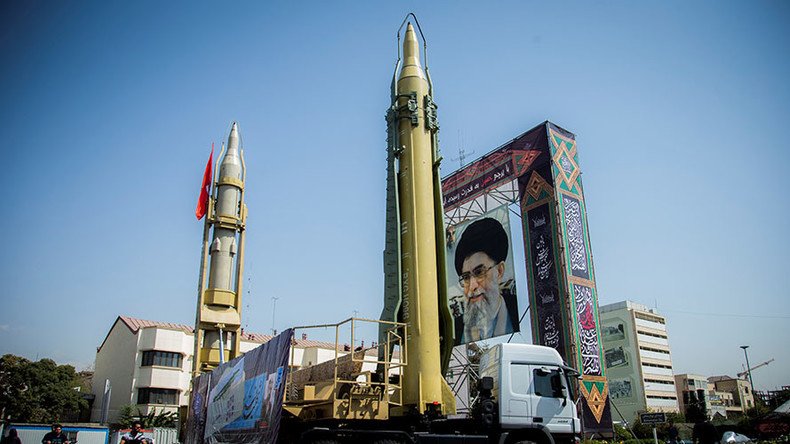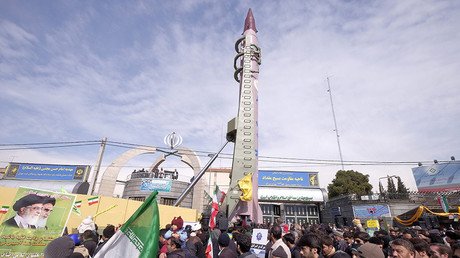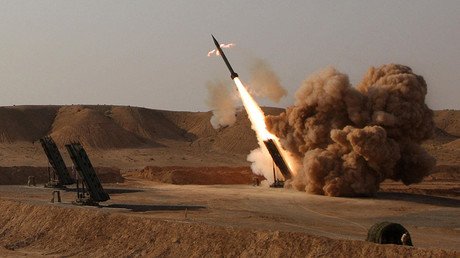‘Defense is non-negotiable’: Tehran to Macron as he mulls sanctions over Iran’s missile program

Tehran has dismissed calls to negotiate its ballistic activities voiced by French President Emmanuel Macron, who earlier considered amendments to the nuclear deal over Iran’s missile program, and even sanctions “if necessary.”
“France is fully aware of Iran’s firm stance towards its defence capabilities, viewing it as non-negotiable,” Bahram Qassemi said Saturday, as quoted in a statement on the ministry’s website. On Thursday, during a visit to Saudi Arabia, Macron said there were “extremely strong concerns about Iran.”
The president proposed revising the Iran nuclear deal of 2015, saying it “must be preserved,” but “complemented with two pillars,” which would include “a negotiation on the ballistic activity of Iran, with sanctions if necessary,” and a discussion on “restraining Iranian hegemony in the region.” Previously, Paris voiced its commitment to the agreement, favoring new nuclear negotiations after 2025, when some of the provisions expire.
Iran has repeatedly told French officials that the agreement is “not renegotiable and Iran doesn’t allow the other sides to annex other issues to it,” Qassemi stated. Paris, according to the spokesman, should remain “realistic, fair and farsighted” over “sensitive developments in the Middle East and the Persian Gulf regions.”
READ MORE: Saudi Arabia v Iran: What’s behind bitter feud between Middle Eastern powers?
“Allegations raised by some Persian Gulf states with the aim of tarnishing the image of the Islamic Republic” shouldn’t sway France, Qassemi said. Earlier, Saudi Arabia accused Iran of “a clear act of aggression that targets neighboring countries, and threatens peace and security in the region and globally.” This came after “its [Iran’s] Houthi proxy” in Yemen fired a missile towards the Saudi capital last week. While Iran denies allegations it provides weapons to the rebels, Macron said the missile was “obviously” Iranian, echoing US claims.
The incident is a “part of this ballistic activity of Iran in the region, which is not covered by the [nuclear] deal,” Macron told the Times. “So we should negotiate a new series of criteria and a new treaty with Iran to stop their ballistic activities in the region,” he said, adding that Iran’s role in Iraq, Syria, Lebanon, and Yemen “destabilizes a lot of people and the whole region.”
“France officials including its president are well aware that levelling false accusations against the Islamic Republic of Iran stands in stark contradiction to the realities of the Middle East over the past decades,” Qassemi responded. The Iraqi parliament’s National Security and Foreign Policy Commission spokesman, Hossein Naqavi Hosseini, called Macron’s remarks “an example of intervention in the internal affairs of Iran.”
Although Iran’s ballistic program is not included under the terms of the nuclear agreement, also known as the Joint Comprehensive Plan of Action (JCPOA), US President Donald Trump has maintained his tough stance on Iran, refusing to re-certify Iran’s compliance in October. The president passed the matter to the US Congress, giving lawmakers 60 days to decide whether to re-impose sanctions. The move faced a serious backlash back then, including from France, which stated it would stick to the deal.
READ MORE: Tehran will 'stand against' Europe if it meddles in defense affairs – judiciary chief
The deal between Tehran and six world powers including France, Russia, the US, China, Germany, and the UK involves the removal of sanctions in exchange for Iran curbing its nuclear program. Following Trump’s move, President Hassan Rouhani stated that Iran “will produce any weapons of any kind that we need and stockpile it and use it at any time to defend ourselves,” which in his eyes does not violate any international agreements.
Moscow fears that dismantling the JCPOA would jeopardize global security. “There is no direct link between nuclear and ballistic programs of Iran in the text [of the agreement],” Russian Deputy Foreign Minister Sergey Ryabkov said in October.














